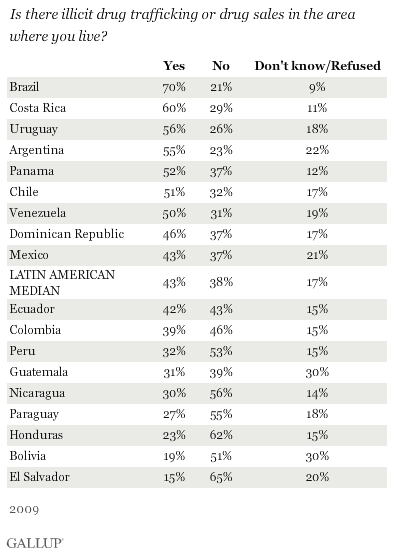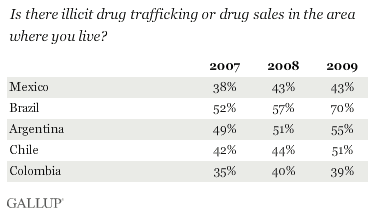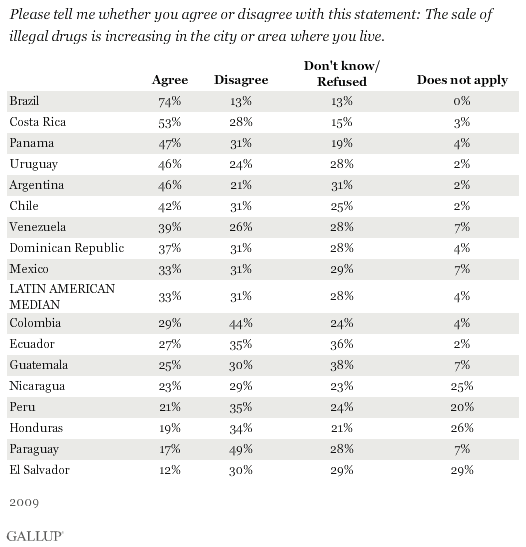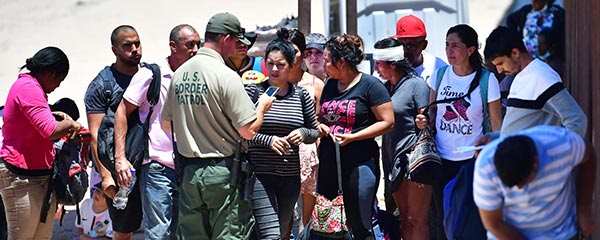WASHINGTON, D.C. -- Gallup surveys suggest illicit drug trafficking is common in communities throughout much of Latin America, including in some of the most well-developed countries such as Chile and Costa Rica. At least half of residents in Brazil, Costa Rica, Argentina, Chile, Panama, Venezuela, and Uruguay say illicit drug trafficking or drug sales are taking place in their neighborhoods.

While Mexico's problems with drug trafficking often make the news, Gallup's surveys in the region in 2009 show the problem is as widespread, if not more so, in other Latin American countries. Forty-three percent of Mexicans say illicit drug trafficking is taking place in their neighborhoods, which is average for the region, but adults in several countries are far more likely to say this is happening where they live.
Adults in Brazil, Costa Rica, Argentina, Chile, Panama, Venezuela, and Uruguay since the early days of Mexico's drug war in 2007 have generally been more likely than Mexicans to say illicit drugs are being sold in their neighborhoods. Further, while the overall trend stayed flat in Mexico between 2008 and 2009, the numbers climbed in some of the region's other largest countries, including Argentina, Chile, and particularly Brazil, where the figure climbed to 70% in 2009. In Colombia, where anti-drug efforts have been ongoing for more than a decade, there was no change from 2008 to 2009.

Many of the countries where majorities say illicit drug sales are taking place in their neighborhoods are drug transit countries, part of the pipelines to destinations in either North America or Europe. In each of these countries, the percentage who say drug sales are increasing is higher than the 33% median for the region. In addition to being more likely than residents of any other Latin American country to say illicit drug sales are taking place in their neighborhoods, Brazilians are the most likely to see the problem as increasing (74%). Mexicans, again, are about average for the region.

Bottom Line
The attention drawn by Mexico's drug violence should not overshadow the reality that illicit drug trafficking is common in much of Latin America. Gallup data point to the importance of emphasizing anti-drug strategies in diplomatic relations with all major trade partners in the region -- particularly Brazil, where residents have become more likely over the past two years to perceive that drug trafficking in on the rise. Such a holistic approach may be the only way to stem the northward flow of drugs through Mexico's war-torn regions over the long term.
For custom research from the more than 150 countries Gallup continually surveys, please contact us.
For complete methodology and specific survey dates, please review Gallup's Country Data Set details.
Survey Methods
Results are based face-to-face interviews with approximately 1,000 adults, aged 15 and older, conducted in 2009 in Argentina, Bolivia, Brazil, Chile, Colombia, Costa Rica, Dominican Republic, Ecuador, El Salvador, Guatemala, Honduras, Mexico, Nicaragua, Panama, Paraguay, Peru, Uruguay, and Venezuela. For results based on the total sample of national adults, one can say with 95% confidence that the maximum margin of sampling error ranges from ±3.3 percentage points in Brazil to ±3.9 percentage points in Peru. In addition to sampling error, question wording and practical difficulties in conducting surveys can introduce error or bias into the findings of public opinion polls.
